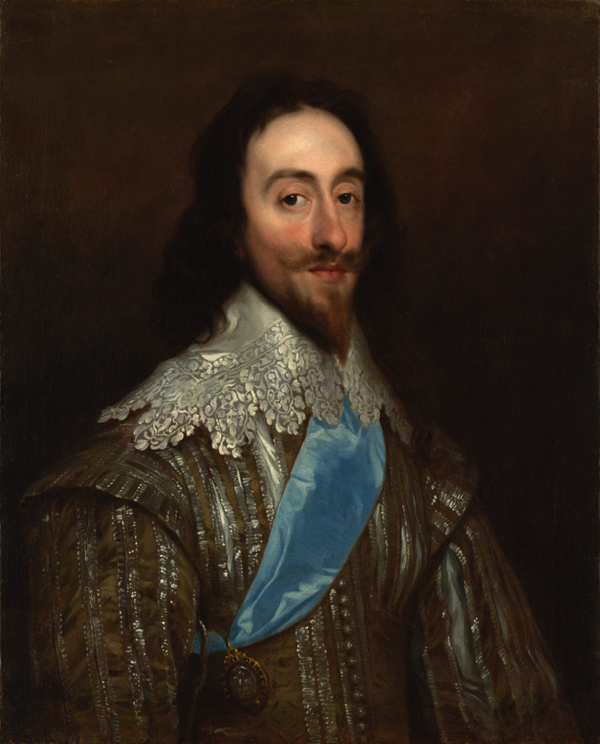Charles I
Charles I is the only English monarch in history to be tried and executed for high treason. As King of England, Charles clashed with the English parliament over the extent of his Royal Prerogative. Parliament eventually rebelled, triggering the English Civil War. Charles’ Royalist troops lost the war and the king was later hung at Whitehall in 1949.
Charles was born in 1600 in Fife as King James I’s second son. His elder brother, Henry, died in 1612 and Charles became King of England in 1625 following the death of his father. He was the second Stuart king.
Despite his princely status, Charles was quiet and shy. He tended to stay in the background because he had a stammer. He was conscious of his diminutive stature: Charles may have been just over five feet tall. In paintings of Charles and his family are normally depicted sitting while he stands in order to hide his height.
Charles was a good linguist and he loved art. He invited famous contemporary artists like Van Dyck and Rubens to paint in England and he bought expensive paintings by old masters such as Titian and Raphael. He raided the royal coffers to sate his passion for collecting art.

Charles was a very religious man. He preferred elaborate and sensual church services replete with ritual and incense, as opposed to pared-back and simple Protestant services. To many Protestants, his penchant for colourful services veered worryingly close to a preference for Catholicism. They feared that Catholicism would slowly encroach on Anglican religious practice. This nervousness about the fate of Anglicanism was one of the causes of the English civil war.
Charles provoked anger by keeping favourites at court. One of his favoured advisors, the Duke of Buckingham, was murdered in 1628. Parliament agreed that Charles could pick his own advisors, but only if the person appointed was deemed acceptable by Parliament.
Charles’ wranglings with Parliament led to the Eleven Years Tyranny: Charles ruled without recourse to Parliament from 1629 to 1640. Charles I was entitled to do this under the Royal Prerogative, and his actions did not provoke much anger across England as a whole.
However, Charles’ money collecting methods triggered discontent. Before Charles’ reign, the ship money levy was only used in coastal areas in times of war. Charles raised money with the levy in peacetime across the whole nation. Between 1634 and 1638 this levy raised £150,000 to £200,000 per year. This tax was paid by relatively poor people as well as the rich. People who refused to pay it were imprisoned. Charles also raised money by granting monopolies. This was done without the support of Parliament.
In 1637, Charles introduced a new Book of Common Prayer in Scotland. The new prayer book was suffused with ritual and grandeur. This was inimical to Scottish protestants, who wanted simple and plain prayer services. In July, riots broke out in Scotland, and in 1938 the General Assembly of the Church of Scotland rejected the prayer book. In 1939-1940 Charles I fought the Scottish Covenanters in the Bishops Wars.
In November 1640, Charles was finally forced to recall Parliament to finance the conflict in Scotland. Parliament would only agree to assist the king on the following conditions.
- Laud and Strafford would be removed as advisors and put on trial.
- Ship Money would be declared illegal
- Charles would agree that Parliament could never be dismissed without Parliament’s assent. If parliament was dismissed, no more than three years would elapse before a new Parliament was called.
Parliament and the King were now on a collision course. Parliament's demands challenged Charles' belief in the divine right of the king - a view that he had been chosen to rule over England by God. In 1642, Charles attempted to arrest five of his key detractors in Parliament. They fled to the safety of the city of London. Conflict was now ever more likely.
Charles raised his royal standard at Nottingham in August 1642 and called on all loyal subjects to support him. Oxford became his war headquarters.
Sir William Waller, a Member of Parliament, called the English Civil War "this war without an enemy". The conflict would result in Charles’ death. He was executed on 30 January 1649 at Whitehall.
MLA Citation/Reference
"Charles I". HistoryLearning.com. 2026. Web.
